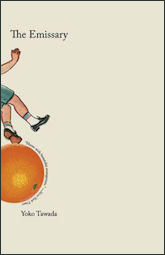Catastrophe is a popular subject for writers: what better way to show the true character of individuals or of a society than through examining how they react when faced with the perils, both physical and moral, that disaster imposes? And of course the action of the disaster itself is exciting: what better way to propel a plot and keep a reader holding their breath and turning their pages?
The Fukushima Daiichi nuclear reactor meltdown—the first since Chernobyl to merit designation as a Major Accident by the International Atomic Energy Agency—occurred on March 11, 2011. Although there were no fatalities, 50,000 households were evacuated, and seven years later, a miles-wide exclusion zone remains in place around the former plant. National traumas invariably inspire writers; Japanese writer Yoko Tawada’s The Emissary, recently published by New Directions, is her eccentric treatment of Fukushima. It’s a story of aftermath, but not one of heroic responders or desperate survivors. Rather, it’s about the new routine of a world that cataclysm has changed, diminished, and shrunk.
Buy the Book


The Emissary
For almost all of its brief length, The Emissary follows two characters, Yoshiro, over a hundred years old but still spry, and his great-grandson Mumei, kind, wise, and unbearably fragile. After some un-described and perhaps unremembered disaster, Yoshiro’s generation has more or less stopped dying: people in their eighties are now classified as “young-elderly.” Their children and grandchildren are healthy too, but Mumei and his whole generation are both chronically unwell and preternaturally accepting of their plight.
If the term “cozy catastrophe” weren’t already established, an enterprising critic might have coined it for this book. Yoshiro and Mumei’s world may be puttering to a halt, but schools remain in session, farmers still plant and laborers still reap. Not all the trains run, but the manga publishers are still going, and even creating new franchises for changed circumstances. The young don’t realize quite how deprived they have become, but readers recognize the scale of their loss. For example, Tawada’s last book was Memoirs of a Polar Bear—which is just what it sounds like—and her most famous story remains The Bridegroom Was a Dog—another literal title—so it’s a shock that animals, aside from the purebreeds at the Yoshiro’s local Rent-a-Dog, have almost entirely vanished from the world: if there’s a living cat, much less a polar bear, we don’t hear of it. It’s a sad, dreamlike world, and some of that sadness derives from a sense that nothing is really happening anymore: the old are dying and the sickly young won’t be replacing them.
Perhaps the least cozy thing about Tawada’s catastrophe is the international situation she describes. Other countries have apparently suffered related problems, though these happenings remain as nebulous as Japan’s afflictions. The world’s countries have agreed to cut off all communications and resolve their problems on their own. Tawada, like Banana Yoshimoto, Yoko Ogawa, and the two Murakamis, Haruki and Ryu, is one of the globally oriented Japanese authors who first began appearing in English translation in the 1990s. Some of these authors, like Haruki Murakami, published translations from English and spent time living abroad, but Tawada is the only one I know of who produced novels and stories in two separate languages, German and Japanese. She’s a writer who celebrates porous borders and cultural blending. And so it’s disturbing that Tawada imagines a future of walls going up, rather than coming down.
One of the defining features of this fiercely bordered world is the gradual extinction of non-Japanese words and the coining of new phrases to replace deported turns of phrase. The Anglicism “jog,” for example, has been replaced with “lope down.” Handling and explicating the various puns must have been a challenge for translator Margaret Mitsutani; her rendering of Tawada’s Japanese prose into English is nearly seamless. Once or twice an untranslatable pun earns a footnote, but so accomplished is the translation that any fair reader must conclude no translator could have preserved the meaning without adding a gloss.
The Emissary doesn’t conclude so much as evaporate: the day-to-day routines of Yoshiro and Mumei give way to a flash-forward that may or may not be a dream and that finally explains who might be an emissary from a tired and static Japan to an exhausted world. I finished the book both perturbed by its abruptness and strangely soothed by its calm tenor, wondering what I might have missed from my perspective as an American in 2018. Ezra Pound, still a presiding aesthetic spirit at New Directions, once said that “literature is news that stays news.” The Emissary, for all its charms of prose, all its exercise of the imagination, and all its timely concerns about borders and barriers, somehow feels like local news from yesterday’s paper.
The Emissary is available from New Directions Publishing.
Matt Keeley reads too much and watches too many movies; he is helped in the former by his day job in the publishing industry. You can find him on Twitter at @mattkeeley.










